科普版六年级英语第四课教案
- 格式:docx
- 大小:14.10 KB
- 文档页数:5
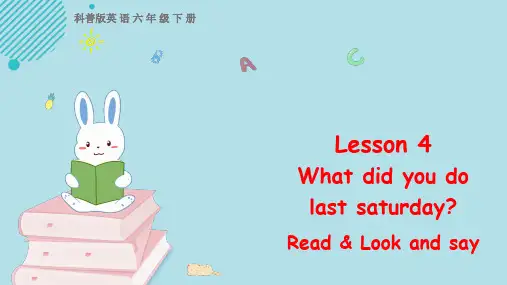
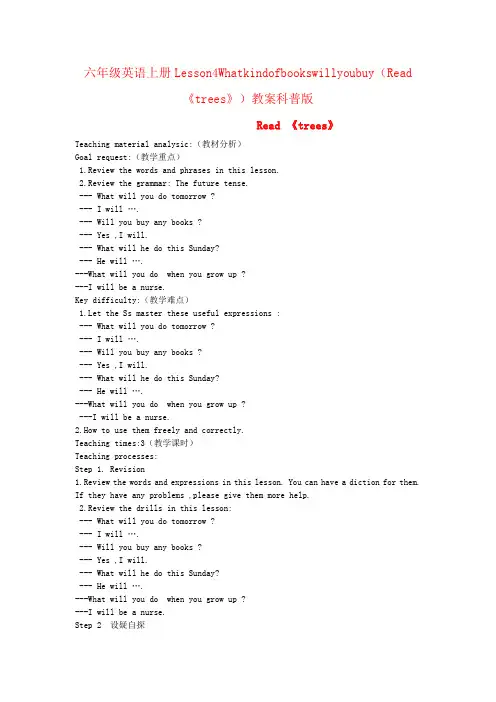
六年级英语上册Lesson4Whatkindofbookswillyoubuy(Read《trees》)教案科普版Read 《trees》Teaching material analysic:(教材分析)Goal request:(教学重点)1.Review the words and phrases in this lesson.2.Review the grammar: The future tense.--- What will you do tomorrow ?--- I will ….--- Will you buy any books ?--- Yes ,I will.--- What will he do this Sunday?--- He will ….---What will you do when you grow up ?---I will be a nurse.Key difficulty:(教学难点)1.Let the Ss master these useful expressions :--- What will you do tomorrow ?--- I will ….--- Will you buy any books ?--- Yes ,I will.--- What will he do this Sunday?--- He will ….---What will you do when you grow up ?---I will be a nurse.2.How to use them freely and correctly.Teaching times:3(教学课时)Teaching processes:Step 1. Revision1.Review the words and expressions in this lesson. You can have a diction for them. If they have any problems ,please give them more help.2.Review the drills in this lesson:--- What will you do tomorrow ?--- I will ….--- Will you buy any books ?--- Yes ,I will.--- What will he do this Sunday?--- He will ….---What will you do when you grow up ?---I will be a nurse.Step 2 设疑自探1、Let the Ss read the text 《trees》on Page24 .Collect their problems and write them on the Bb.2、Ask them to solve them by themselves.Step3 解疑合探1、小组内讨论交流答案。
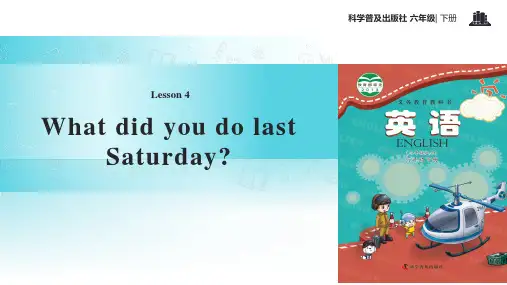
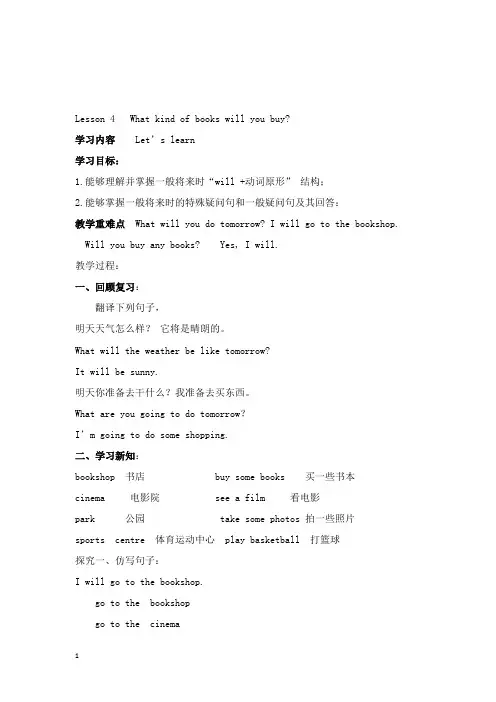
Lesson 4 What kind of books will you buy?学习内容 Let’s learn学习目标:1.能够理解并掌握一般将来时“will +动词原形”结构;2.能够掌握一般将来时的特殊疑问句和一般疑问句及其回答:教学重难点What will you do tomorrow? I will go to the bookshop. Will you buy any books? Yes, I will.教学过程:一、回顾复习:翻译下列句子,明天天气怎么样?它将是晴朗的。
What will the weather be like tomorrow?It will be sunny.明天你准备去干什么?我准备去买东西。
What are you going to do tomorrow?I’m going to do some shopping.二、学习新知:bookshop 书店 buy some books 买一些书本cinema 电影院 see a film 看电影park 公园 take some photos 拍一些照片sports centre 体育运动中心 play basketball 打篮球探究一、仿写句子:I will go to the bookshop.go to the bookshopgo to the cinemago to the parkgo to the sports centreI will.....探究二、改为一般疑问句并作肯定回答:I will buy some books.some 一些,用在陈述句中;any 一些,用在疑问句、否定句。
Will you buy any books?Yes, I will.探究三、对划线部分提问:I will go to the bookshop.What will you do?探究四、小组探究,合作完成:1.——What will you do tomorrow?——I will go to the bookshop.——Will you buy any books?——Yes, I will.2.——What will you do tomorrow?——I will go to the cinema.——Will you see a film?——Yes, I will.3.——What will you do tomorrow?——I will go to the park.——Will you take any photos?——Yes, I will.4.——What will you do tomorrow?——I will go to the sports centre.——Will you play basketball?——Yes, I will.三、巩固练习1.——Will you buy any books?——_______________________A.Yes,I do.B.Yes, I will.C.No, I will.2.He will ________ basketball this Sunday.A. playB.playsC.playing3. I will do sports tomorrow. (改为一般疑问句)_______________________________________________4. We will play football tomorrow afternoon. (对划线部分提问)_________________________________________________四、课堂小结:谈谈你的收获。
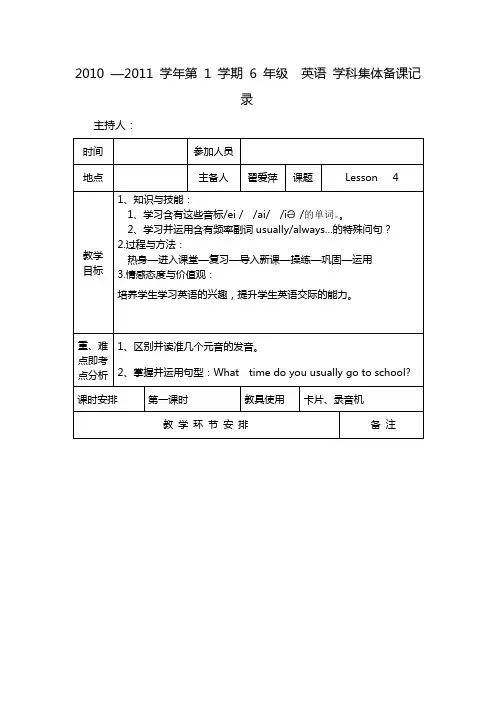
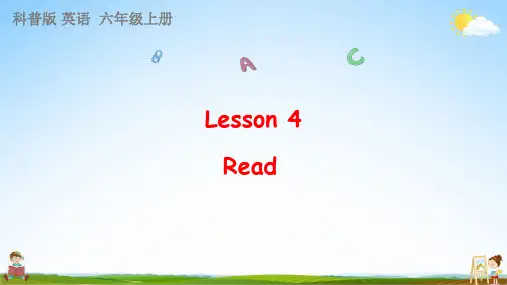
Lesson 4Read科普版 英语 六年级上册—What will you do when you grow up ?—I will be a_________.I will work in _________.Warm up—What will you do when you grow up?—I will be a _____.I will work in ________.—What will you do when you grow up?—I will be a __________.I will work in __________.—What will you do when you grow up?—I will be a _________.I will work in ___________.hill 小山;山丘mountain山脉;陡峭的山[h ɪl] Many people will go up to the hills and plant trees.[ˈma ʊnt ən] The mountain is high.air空气wet潮湿的 [er] Trees can make the air clean.[wet] It will be too cold or too wetin some places.healthy 健康的more 更多的[m ɔ:(r)] [ˈhelθi]We must plant more trees.They will make the people healthy .country国家[ˈkʌntrɪ]They will make our country more beautiful.Lead in绿树成荫,国家美丽Read♦ Do you know Tree Planting Day?♦ When is the Tree Planting Day?♦ What do people usually do on that day?♦ ...Read quickly by yourselvesIt is Tree Planting Day tomorrow. Many people will go up to the hills and plant trees.Trees can make the air clean. Animals and people can get food from them, too.But people are cutting down too many trees. That will bring about great changes in theweather. It will be too cold or too wet in some places. It will be too hot or too dry in other places.We must plant more trees. They will make the people healthy, and make our country more beautiful.What will people do tomorrow?It’s Tree Planting Day tomorrow. Many people will go up to the hills and plant trees.明天是植树节。
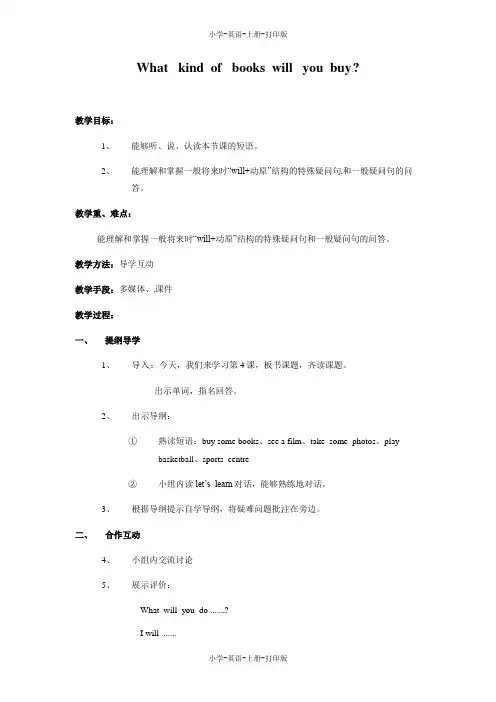
What kind of books will you buy?教学目标:1、能够听、说、认读本节课的短语。
2、能理解和掌握一般将来时“will+动原”结构的特殊疑问句和一般疑问句的问答。
教学重、难点:能理解和掌握一般将来时“will+动原”结构的特殊疑问句和一般疑问句的问答。
教学方法:导学互动教学手段:多媒体、课件教学过程:一、提纲导学1、导入:今天,我们来学习第4课,板书课题,齐读课题。
出示单词,指名回答。
2、出示导纲:①熟读短语:buy some books、see a film、take some photos、playbasketball、sports centre②小组内读let’s learn对话,能够熟练地对话。
3、根据导纲提示自学导纲,将疑难问题批注在旁边。
二、合作互动4、小组内交流讨论5、展示评价:---What will you do ......?---I will ......---Will you......?---Yes ,I will.some用于肯定句,any 用于一般疑问句。
6、质疑解难:通过本节课的学习,你有什么疑问,大胆提出来。
三、导学归纳:通过本节课的学习,你有什么收获?7、生归纳8、师指导四、拓展运用9、拓展训练10、编题自练五、板书设计What kind of books will you buy?---What will you do ...?---I will ...---Will you....?---Yes ,I will.It’s on the fifth floor教学目标:1、Read and spell the new words: first, second, third, fourth, fifth, floor2、Read the important sentences:---Where is the reading room?---It’s on the fifth floor.3、培养学生的口语交际能力。
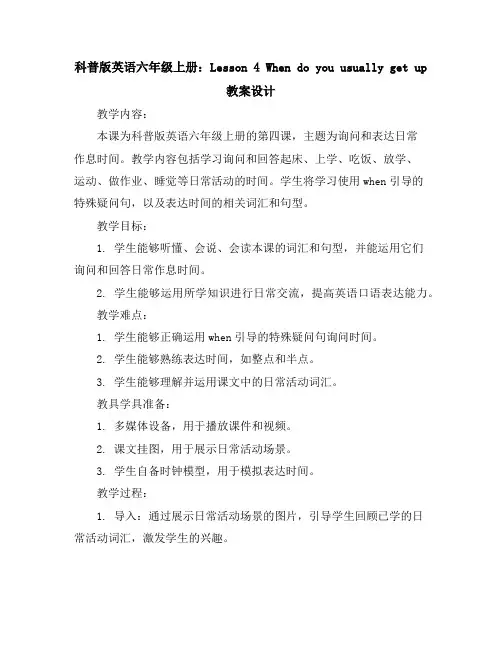
科普版英语六年级上册:Lesson 4 When do you usually get up教案设计教学内容:本课为科普版英语六年级上册的第四课,主题为询问和表达日常作息时间。
教学内容包括学习询问和回答起床、上学、吃饭、放学、运动、做作业、睡觉等日常活动的时间。
学生将学习使用when引导的特殊疑问句,以及表达时间的相关词汇和句型。
教学目标:1. 学生能够听懂、会说、会读本课的词汇和句型,并能运用它们询问和回答日常作息时间。
2. 学生能够运用所学知识进行日常交流,提高英语口语表达能力。
教学难点:1. 学生能够正确运用when引导的特殊疑问句询问时间。
2. 学生能够熟练表达时间,如整点和半点。
3. 学生能够理解并运用课文中的日常活动词汇。
教具学具准备:1. 多媒体设备,用于播放课件和视频。
2. 课文挂图,用于展示日常活动场景。
3. 学生自备时钟模型,用于模拟表达时间。
教学过程:1. 导入:通过展示日常活动场景的图片,引导学生回顾已学的日常活动词汇,激发学生的兴趣。
2. 新课呈现:播放课件,呈现本课的主要句型和词汇。
教师引导学生跟读并模仿,确保学生正确掌握发音和用法。
3. 语言实践:学生分组进行角色扮演,模拟询问和回答日常作息时间。
教师巡回指导,纠正发音和语法错误。
5. 作业布置:布置相关的练习题,巩固所学知识。
板书设计:1. Lesson 4 When do you usually get up2. 词汇:起床、上学、吃饭、放学、运动、做作业、睡觉等日常活动词汇。
3. 句型: When do you usually get up? I usually get upat4. 时间表达:整点和半点的表达方法。
作业设计:1. 完成练习册的相关练习题。
2. 写一篇关于自己日常作息时间的小短文。
3. 与家长进行英语对话,询问和回答日常作息时间。
课后反思:本节课通过展示日常活动场景的图片,激发了学生的学习兴趣。
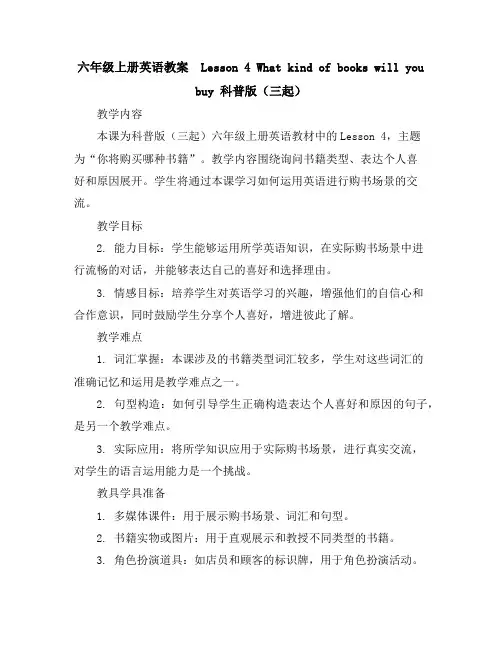
六年级上册英语教案 Lesson 4 What kind of books will youbuy 科普版(三起)教学内容本课为科普版(三起)六年级上册英语教材中的Lesson 4,主题为“你将购买哪种书籍”。
教学内容围绕询问书籍类型、表达个人喜好和原因展开。
学生将通过本课学习如何运用英语进行购书场景的交流。
教学目标2. 能力目标:学生能够运用所学英语知识,在实际购书场景中进行流畅的对话,并能够表达自己的喜好和选择理由。
3. 情感目标:培养学生对英语学习的兴趣,增强他们的自信心和合作意识,同时鼓励学生分享个人喜好,增进彼此了解。
教学难点1. 词汇掌握:本课涉及的书籍类型词汇较多,学生对这些词汇的准确记忆和运用是教学难点之一。
2. 句型构造:如何引导学生正确构造表达个人喜好和原因的句子,是另一个教学难点。
3. 实际应用:将所学知识应用于实际购书场景,进行真实交流,对学生的语言运用能力是一个挑战。
教具学具准备1. 多媒体课件:用于展示购书场景、词汇和句型。
2. 书籍实物或图片:用于直观展示和教授不同类型的书籍。
3. 角色扮演道具:如店员和顾客的标识牌,用于角色扮演活动。
教学过程1. 导入:通过展示不同类型的书籍图片,引导学生复习和预习相关词汇。
2. 新授:展示购书场景的多媒体课件,教授本课的重点句型和表达方式。
3. 实践:学生分组进行角色扮演,模拟购书场景,运用所学知识进行交流。
4. 巩固:通过小组竞赛等形式,巩固学生对词汇和句型的掌握。
板书设计板书将清晰展示本课的关键词汇、句型以及购书场景对话的示例。
同时,通过颜色和图示的辅助,增强学生对知识点的记忆和理解。
作业设计1. 书面作业:完成课后练习题,巩固词汇和句型。
2. 口头作业:学生分组录制购书场景的英语对话视频,至学习平台。
3. 扩展阅读:鼓励学生阅读英文书籍,并分享自己的阅读体验。
课后反思本教案以严谨的语言、清晰的逻辑结构,全面覆盖了教学内容、目标、难点、教具学具准备、教学过程、板书设计、作业设计和课后反思等八个方面,确保了教学活动的系统性和完整性。
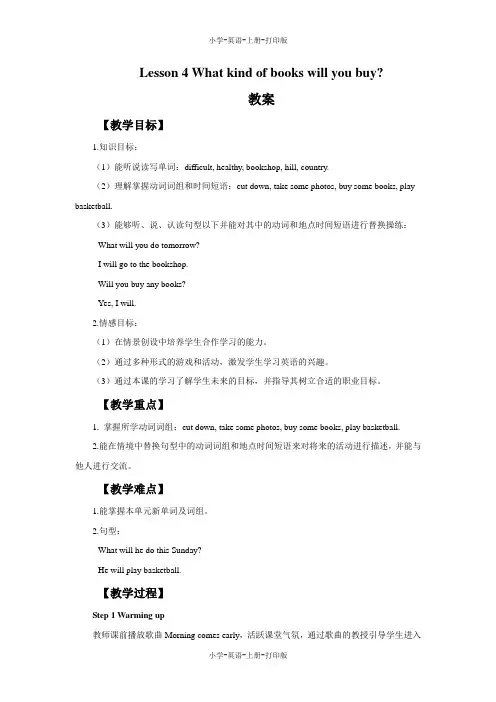
Lesson 4 What kind of books will you buy?教案【教学目标】1.知识目标:(1)能听说读写单词:difficult, healthy, bookshop, hill, country.(2)理解掌握动词词组和时间短语:cut down, take some photos, buy some books, play basketball.(3)能够听、说、认读句型以下并能对其中的动词和地点时间短语进行替换操练:--What will you do tomorrow?--I will go to the bookshop.--Will you buy any books?--Yes, I will.2.情感目标:(1)在情景创设中培养学生合作学习的能力。
(2)通过多种形式的游戏和活动,激发学生学习英语的兴趣。
(3)通过本课的学习了解学生未来的目标,并指导其树立合适的职业目标。
【教学重点】1. 掌握所学动词词组:cut down, take some photos, buy some books, play basketball.2.能在情境中替换句型中的动词词组和地点时间短语来对将来的活动进行描述,并能与他人进行交流。
【教学难点】1.能掌握本单元新单词及词组。
2.句型:--What will he do this Sunday?--He will play basketball.【教学过程】Step 1 Warming up教师课前播放歌曲Morning comes early,活跃课堂气氛,通过歌曲的教授引导学生进入新课的学习,提高其学习兴趣。
Morning comes early and bright with dew.Under your window I sing to you.Up then my comrades, up then my comrades,Let us be greeting the morn so blue.Step 2 Presentation1. Let’s talk(1)看Let’s talk部分的教学内容。
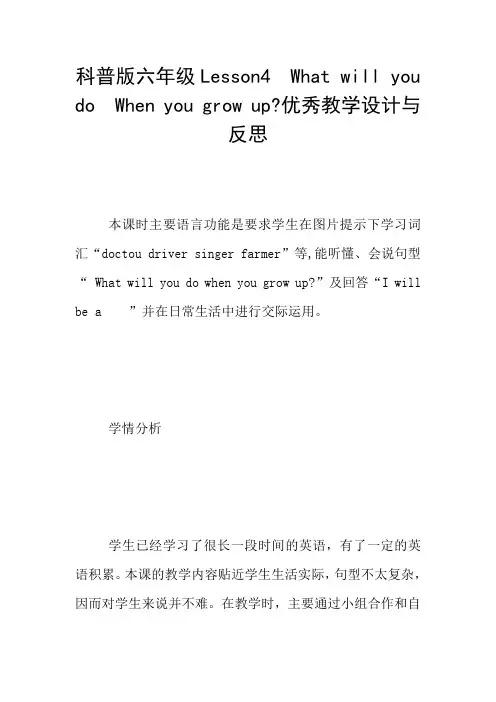
科普版六年级Lesson4 What will you do When you grow up?优秀教学设计与反思本课时主要语言功能是要求学生在图片提示下学习词汇“doctou driver singer farmer”等,能听懂、会说句型“ What will you do when you grow up?”及回答“I will be a ”并在日常生活中进行交际运用。
学情分析学生已经学习了很长一段时间的英语,有了一定的英语积累。
本课的教学内容贴近学生生活实际,句型不太复杂,因而对学生来说并不难。
在教学时,主要通过小组合作和自主学习相结合,更大限度地发挥学生的主观能动性和团结意识,使学生对英语学习保持更大的热情。
教学目标1、能听懂,会说会认读并会拼写本课单词,并能根据中文写出英文。
2、理解和掌握一般将来时,与职业话题相联系的用法。
3、掌握“一般将来时”和“日期”话题相联系的用法;并能用本课交际语进行会话。
4、熟读短文,能理解短文大意,能回答与短文有关的问题,或根据图片或关键词进行复述。
教学重点和难点掌握“一般将来时”和“日期”话题相联系的用法;并能用本课交际语进行会话。
教学过程预习自学(5分钟)1、根据音标自读单词。
2、自读自译“Let’stalk ”部分。
小组交流,提出疑难问题(5分钟)小组内互读互纠,针对自己在预习中的疑难点,在小组内交流解决这一环节的设计是为了充分发挥学生的主观能动性。
教师点拨指导:(5分钟)1、单词:grow \worker\build\large\song2、读、译句子。
What_will _you do when you grow up ?I will be a doctor.(学生根据老师展示的重点内容在小组内学习。
让学生带着明确的任务去听。
给学生充分练习的机会。
让学生充分参与课堂。
自由练习(10分钟)表演展示(5分钟)教师引导,点拨、组织,调控。
1、识记单词。
科普版六年级英语下册Lesson4 What will you do when you grow up?公开课
教学设计与反思
教材分析
本节课学习的中心是关于职业的表达和各种职业的具体工作。
本科课题切合实际,学习各种职业的英语表达并创设情境,让同学们可以畅所欲言的表达自己长大后想做什么?
学情分析
1. 和学生交谈自己长大后理想的职业是什么?通过交谈学生们积极性很高,很期待学习怎么样用英语来表达自己长大后想干什么?
2.六年级的学生有一定的英语基础。
让他们结合之前学习过的内容先认知一下课文。
教学目标
对于本课的黑体单词要求四会
掌握各种职业的英文表达并熟悉具体做什么工作
能听懂会说本课的对话,并能在具体情境中运用
教学重点和难点
能够听说认读本节课的重点句型并能交谈表演
What will you do when you grow up?
I will be …。
六年级上英语教案 Lesson 4 When do you usually get up 科普版教学内容本节课是科普版六年级上册英语的第四课,主题是询问和描述日常作息时间。
教学内容主要围绕常用的时间表达方式和询问日常活动的句型。
通过本课的学习,学生能够掌握询问和回答关于起床、吃饭、上学等日常活动的英语表达,并能够运用所学句型和词汇进行简单的日常交流。
教学目标1. 知识目标:学生能够听懂、会说、会读本节课的关键词汇和句型,如 "get up"、"have breakfast"、"go to school"、"at seveno'clock" 等。
2. 能力目标:学生能够运用所学句型和词汇询问和描述自己的日常作息时间,并能进行简单的日常交流。
3. 情感目标:培养学生对英语学习的兴趣,提高他们的自信心和合作意识。
教学难点1. 时间表达的准确性:学生需要掌握正确的时间表达方式,如"at seven o'clock"、"at half past seven" 等。
2. 询问和描述日常活动的句型:学生需要学会使用 "When doyou usually get up?"、"I usually get up at seven o'clock." 等句型进行询问和描述。
教具学具准备1. 教师准备:PPT课件、教学录音、时间卡片、活动表格等。
2. 学生准备:英语课本、笔记本、彩笔等。
教学过程1. 导入:教师通过展示一些日常活动的图片,引导学生回顾和复习与本课相关的词汇和句型,激发学生的兴趣和积极性。
2. 新课呈现:教师通过PPT课件呈现本节课的关键词汇和句型,并进行讲解和示范,帮助学生理解和掌握。
3. 练习:学生通过听录音、模仿跟读、填空、角色扮演等方式进行练习,巩固所学知识。
Lesson4 教材分析Title:Lesson FourTopic:When do you usually get up?Importance:本课的话题是“你通常几点起床?”,通过两名小学生互相询问起床时间,引出本课的主题句“What time do you usually get up?”和“What time does she get up?”及相关答语。
通过练习,学生熟练掌握一般现在时的各种句式。
Markers:picturesMethods:情境教学法、引导启发、兴趣激励教学内容和要求(Teaching contents and demands)项目内容要求语音字母组合ear发音, 能拼读含这些语音的单词词汇Year, by要求能听懂和会说,会拼读,并能够根据中文拼写出英文Weekday, factory, for a moment, timedifference要求能听懂,会说,会认读语言结构What time do you usually get up?I usually get up at six.What time does he usually go to school?He usually goes to school at seventwenty.熟练掌握和运用一般现在时的各种句式(重点是what time引导的特殊疑问句)。
交际用语--When do you usually get up?--I usually get up at six.--What time does she get up?--She always gets up before six.能听懂、会说,并能用来进行会话和交际。
阅读Is Lily’s clock slow?能理解故事大意,并能回答与课文内容相关的问题或能根据图片及关键词进行复述。
教学内容分析:1.语音本课的四会单词year中的字母组合读作,与early相同;by中的字母y读作,与上一课的type相同,教师教学时可罗列出来让学生通过对比来记忆。
Lesson 4.when do you usually get up ?(“Let’s learn”and “A game ”)教学目标:1.熟读并理解Let’s learn ,并能用主题句型进行替换练习。
2.能用本课主题句型“what time do you usually get up ? I usuallyget up at six .what time does she usually go to school ? she goes to school at seven twenty .”进行交际。
教学重点:目标2教具准备:多媒体课件教学过程:一、复习:1、根据学生的表演,补充对话中所缺的内容。
2、熟练读出下列动词词组并翻译成中文。
二、出示学习目标:会运用以下日常交际用语:1.—What time do you usually get up ?—I usually get up at six .2.—What time does he go to school ?—He usually goes to school at seven twenty .三:采用“先学后教,当堂训练”的教学模式教学Let’s learn :(一)、主题句一:1、出示主题句:—What time do you usually get up ?—I usually get up at six .2、出示自学提示:⑴、个人——试着读并进行翻译。
⑵、同桌:我能准确熟练地背诵起来!⑶、我还能用替换词仿主题句进行造句。
3、学生根据提示进行自学。
4、检查自学效果:(二)、主题句二:1、出示主题句:—What time does he go to school ?—He usually goes to school at seven twenty .2、出示自学提示:⑴、我能:准确地读出来,并能进行正确地进行翻译。
⑵、我发现了:主题句一和二的不同。
【教学参考】第四课时教案(1)复习检查A.复习单词:教师出示本课的单词卡片,让学生根据中文写出或说出英文,或者根据英文说出中文,还可让学生根据音标写出英文单词或中文意思(根据对本课单词不同的要求采取不同的方法)。
B.复习对话:叫若干学生用角色表演的方式,将本课的主题句及交际用语与以前学过的主题句及交际用语结合起来进行自由对话。
(2)学习Read的后三个场景A.导入新课教师先简略回顾前三个场景的内容,再用汉语介绍后三个场景的故事大意,然后按下列步骤导入:l)教师放后三个场景的录音,让学生通过听初步感知故事内容。
2)放第二遍录音,让学生边看图边听录音,明白每幅图的内容。
3)教师给学生讲解阅读中所包含的知识点。
4)逐句放录音,让学生跟说并泽成汉语。
B.操练学生初步了解文章内容之后,教师组织学生进一步熟读课文。
教师领读,学生跟读或教师放录音,学生跟读:学生对文章内容熟悉了之后,回答与课文有关的问题(教师可根据课文内容白行设计问题,引导学生问答,学生能基本回答正确即可)。
下列问题供教师参考:1. Who did the prince dance with that night?2, What did Cinderella lose on the way?3. What did the prince do after that night?4. Did Cinderella live happily after she became the prince's wife?对掌握程度较好的学生、班级或学校,教师还可以提出更高要求,让他们能够看图和关键词进行复述,具体方法如下:l)教师在教学挂图下写上相应的关键词,带学生边看图及关键词边跟着录音读文章。
2)给学生几分钟时间,让学生自己默默试着复述。
3)教师带领学生集体根据关键词复述。
4)让学生集体复述(没有老师的引导)。
5)让单个学生到讲台前复述,直到全班都能熟练复述故事内容为止。
Lesson4 What did you do last Saturday ? 第二课时 let”s learn
Teaching process:
Stepl warmingup: (2minutes)
Review the knowledge what we learned before. T: Who wants to answer?
SI: ......................
S2: ......................
T: Good job.
Step 2 设疑自探:(5minutes)
A: What did you do last Saturday?
B: I saw a film.
Look at these, do you have any questions?
S 1: How to read them?
S2: What's the meaning of them?
S3: How to use them?
(Give Ss five minutes to solve these two ques tions in groups.)
Step 3解疑合探(18minutes)
After three minutes.
一) T: Have you finished it ?
S: Yes
T: Who wants to answer the first questi ons?
S1: .........................
T: Anyone else?
S2:.......... ................
S3: ............................
T: OK,the next questions, who wants to answe r?
S1: .......................
T:Last questions,volunteers?
S1: .......................
T:So we know the answer is:
A: What did you do last Saturday?
B: I saw a film.
A: What did you do last Saturday?
B: I made a cake.
A: What did you do last Saturday?
B: I flew a kite.
A: What did you do last Saturday?
B: I did my homework:.
Z) T :OK, let's practice this text.
1) Teacher and student:
A: What did you do last Saturday?
B: I saw a film.
A: What did you do last Saturday?
B: I made a cake.
A: What did you do last Saturday?
B: I flew a kite.
A: What did you do last Saturday?
B: I did my homework.
2) Second boys vs girls.
A: What did you do last Saturday?
B: I saw a film.
A: What did you do last Saturday?
B: I made a cake.
A: What did you do last Saturday?
B: I flew a kite.
A: What did you do last Saturday?
B: I did my homework.
3) Third in pairs
三) Ifyou are tired, let's sing a song, list en to tape and try
you best to follow it.
[]) Then I'll give you five minutes to look
at the listen and
circle, and then I'll choose some pairs to check the answer.
Step4质疑再探(10 minutes)
T: After we learned this lesson, do you have any other questions?
Ss: No.
T: Let's go on.
Step5 运用拓展(5minutes)
1. T: what have we learned in this lesscn? S1: ............................
S2: ............................
T: Good, everybody have done a job.
2. Can you make exercises by yourselves?
3. The teacher show some exercises:
Fill in the blanks with the verb'3 past tens e.
am .... is--- are ....
do--- have--- tell ....
come--- buy .... say---
fly .... go ..... get ....
take--- see .... ride---
begin .... read .... make---
Bb writing design: (板书设计)
Lesson4 What did you do last Sunday ? What did you do last Sunday?
I went to the park.。